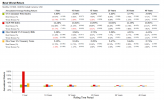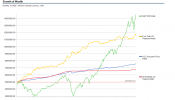Always Learning
Registered User
- Messages
- 142
Hi All,
I'm completely new here so I'm not familiar with the forums but I think I'm in the right section for this post.
I have recently sold a business, from this sale I will end up with €5 - €6M net to invest after setting aside a little pot for immediate purchases / gifts. I want to make an annual yield of 10% on this. I intend to draw down around €200K per annum from the investment as a wage and allow the rest to build up for further investment. I have borthers who are not involved but who I would like to pay some kind of dividend / wage to over the years also.
I have a few questions
- Has anybody used wealth management services before, do you have any company you would recommend, can you elaborate on the process.
- Is there any reason not to invest all this is commercial & residential property to let out and simply live off the return. Seems to me like this is the obvious choice to achieve a gross yield of 10%.
- Are there any large scale / professional landlords here that I could speak with privately who may be able to save me making the same mistakes they did when they were starting out.
- Has any body else here experience in dealing with a fund like this? Again, I'd love to pick your brain and would appreciate the benefit of your experience to avoid making obvious mistakes.
- Are there other obvious investments with a good return I'm ignoring aside from property that could provide the return I'm looking for.
I understand this seems like a naïve question for someone who has such a large fund available, surely I know by now how to make money with money you say, so I will give you a small bit of background. I'm early 30's, I am not new to business but still have a lot to learn. However, my expertise over the years has been concentrated 100% on the industry I was in. As part of the sale, I can no longer operate in that industry. So I can no longer use my expertise to earn. Therefore, I'm left researching alternative avenues on how to use this money in order to set myself and my immediate family up. The reason I'm thinking property is the way forward is because I already 3 properties which I let out and the gross return on these is above 10%, it's not too much hassle to look after and so it seems like expanding in that sector could be the way forward, especially considering I won't have to borrow for any property I purchase.
I know it's a long post, thanks for reading and I appreciate anyone taking the time to give some advice.
I'm completely new here so I'm not familiar with the forums but I think I'm in the right section for this post.
I have recently sold a business, from this sale I will end up with €5 - €6M net to invest after setting aside a little pot for immediate purchases / gifts. I want to make an annual yield of 10% on this. I intend to draw down around €200K per annum from the investment as a wage and allow the rest to build up for further investment. I have borthers who are not involved but who I would like to pay some kind of dividend / wage to over the years also.
I have a few questions
- Has anybody used wealth management services before, do you have any company you would recommend, can you elaborate on the process.
- Is there any reason not to invest all this is commercial & residential property to let out and simply live off the return. Seems to me like this is the obvious choice to achieve a gross yield of 10%.
- Are there any large scale / professional landlords here that I could speak with privately who may be able to save me making the same mistakes they did when they were starting out.
- Has any body else here experience in dealing with a fund like this? Again, I'd love to pick your brain and would appreciate the benefit of your experience to avoid making obvious mistakes.
- Are there other obvious investments with a good return I'm ignoring aside from property that could provide the return I'm looking for.
I understand this seems like a naïve question for someone who has such a large fund available, surely I know by now how to make money with money you say, so I will give you a small bit of background. I'm early 30's, I am not new to business but still have a lot to learn. However, my expertise over the years has been concentrated 100% on the industry I was in. As part of the sale, I can no longer operate in that industry. So I can no longer use my expertise to earn. Therefore, I'm left researching alternative avenues on how to use this money in order to set myself and my immediate family up. The reason I'm thinking property is the way forward is because I already 3 properties which I let out and the gross return on these is above 10%, it's not too much hassle to look after and so it seems like expanding in that sector could be the way forward, especially considering I won't have to borrow for any property I purchase.
I know it's a long post, thanks for reading and I appreciate anyone taking the time to give some advice.


